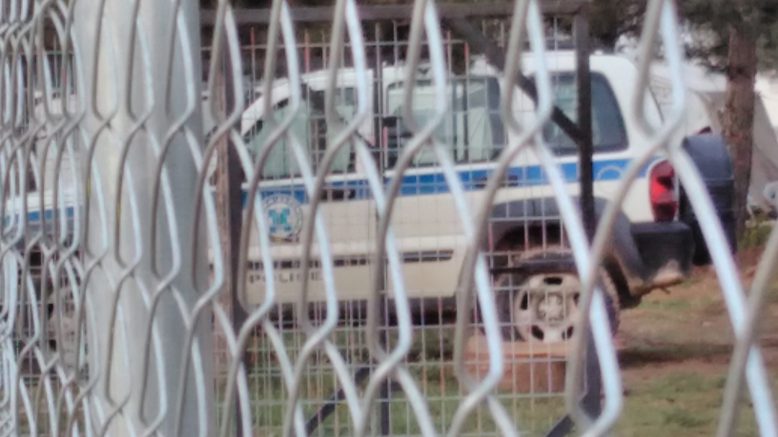The detention center of Paranesti is located in the north-east of Greece, in a little village with the same name. It is about 25 km away from the next bigger city, Drama, and almost 200 km away from Thessaloniki. Three up to 4 m high fences with barbered wire on top surround the facility to prevent the detained migrants from leaving. Each section of the camp is separated by additional fences. The people are housed in little bungalows, which do not protect them properly from the cold during wintertime, as a former inhabitant told us. Searchlights are set up on top and in case of an escape police is ready to find the people immediately. The detention center was constructed in 2012 under the New Democracy government. The current supposedly left government Syriza did not change much on the detainment policies.
All over Greece, particularly on the Islands and in Idomeni, European citizens have been showing their solidarity and volunteer in high numbers to cover the basic needs of people. However, detention centers and camps on the countryside receive less or no solidarity and media attention. For the past three months, a detained migrant in Paranesti told us via WhatsApp that only two people visited the closed facility to talk to the people there. Besides that, two small protests in solidarity with the detained migrants were staged1. The daily life though is dominated by the same gloomy and boring routines.
Unfortunately, visitors only are allowed access if they know somebody and even then visitors might not be allowed to enter, as the decision who enters depends on the mood of the despotic chief of police. Former detainees reported that they were only permited to spend 5 to 10 minutes together with their visitors. “We stand together next to the fence and the police is standing next to you all the time, listening and watching what is going on with your friend”.
A man who says he has been inside the prison for more than four month now told us that there are at least 300 male migrants currently detained, among them several unaccompanied minors. Some of the minors are only 13 years old. According to him, the facility could hold more than 500 migrants. Detained people in Paranesti have mainly been picked up and arrested by the police because they did not have valid papers. Some have tried to cross the border with fake papers and have been stopped, others have been stuck in Greece and their papers expired. “We applied for asylum in here, but I didn’t receive any answer yet!” stated one detained man. People who apply for asylum in detention can be detained for up to 6 months. If there is no decision made about their asylum claim in the 6-months period they are released. However, procedures often appear to be arbitrary and access to legal support is very limited.
However, Paranesti has always also been a place of resistance. In 2014 and 2015 migrants of the camp went on hunger strike to struggle for their freedom2. Further, there have been several attempts to break out of the detention camp, although mostly unsuccessful. Migrants have tried to escape the dehumanizing living conditions, the isolation and the life without dignity inside Paranesti by overcoming all three fences. Even if someone manages to overcome the fences, almost everybody gets re-detained as Paranesti is in the middle of nowhere.
Paranesti is another nasty face of European migration policies. People are kept in dehumanizing conditions far away from society without freedom of movement and without any access to information and their legal rights.
Notes
[1] Protest February 2016: https://www.facebook.com
[2] Clandestina, On the Ongoing Hunger Strike of Migrants in Paranesti Camp in Greece

